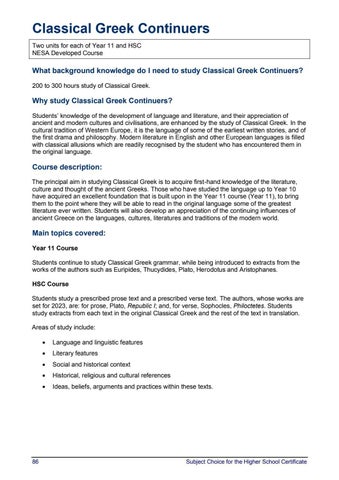Classical Greek Continuers Two units for each of Year 11 and HSC NESA Developed Course
What background knowledge do I need to study Classical Greek Continuers? 200 to 300 hours study of Classical Greek.
Why study Classical Greek Continuers? Students’ knowledge of the development of language and literature, and their appreciation of ancient and modern cultures and civilisations, are enhanced by the study of Classical Greek. In the cultural tradition of Western Europe, it is the language of some of the earliest written stories, and of the first drama and philosophy. Modern literature in English and other European languages is filled with classical allusions which are readily recognised by the student who has encountered them in the original language.
Course description: The principal aim in studying Classical Greek is to acquire first-hand knowledge of the literature, culture and thought of the ancient Greeks. Those who have studied the language up to Year 10 have acquired an excellent foundation that is built upon in the Year 11 course (Year 11), to bring them to the point where they will be able to read in the original language some of the greatest literature ever written. Students will also develop an appreciation of the continuing influences of ancient Greece on the languages, cultures, literatures and traditions of the modern world.
Main topics covered: Year 11 Course Students continue to study Classical Greek grammar, while being introduced to extracts from the works of the authors such as Euripides, Thucydides, Plato, Herodotus and Aristophanes. HSC Course Students study a prescribed prose text and a prescribed verse text. The authors, whose works are set for 2023, are: for prose, Plato, Republic I; and, for verse, Sophocles, Philoctetes. Students study extracts from each text in the original Classical Greek and the rest of the text in translation. Areas of study include:
86
•
Language and linguistic features
•
Literary features
•
Social and historical context
•
Historical, religious and cultural references
•
Ideas, beliefs, arguments and practices within these texts.
Subject Choice for the Higher School Certificate
